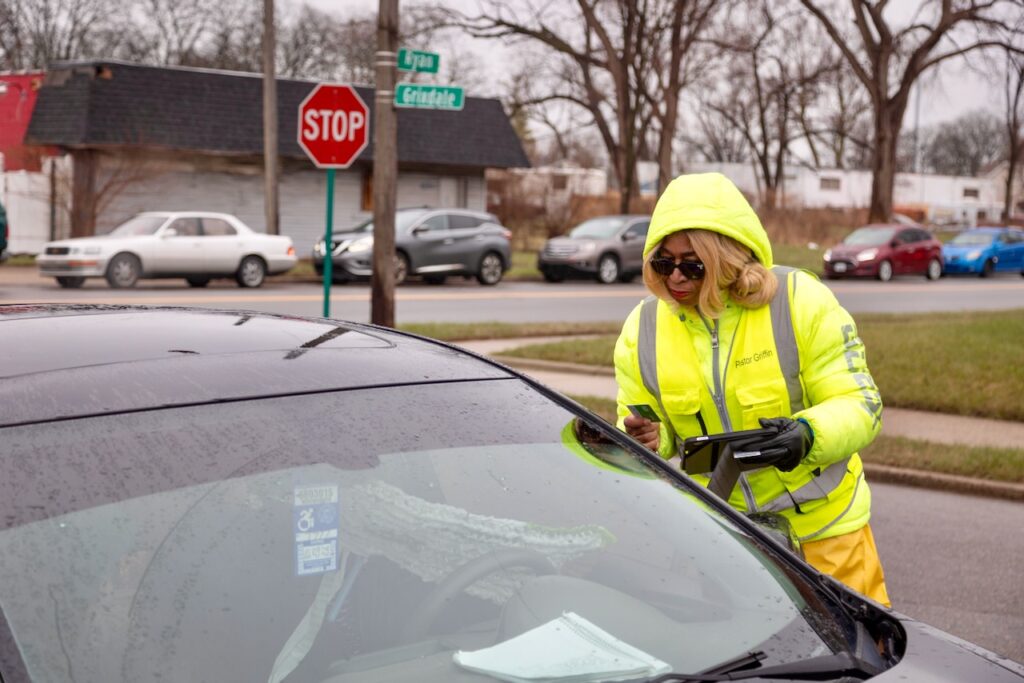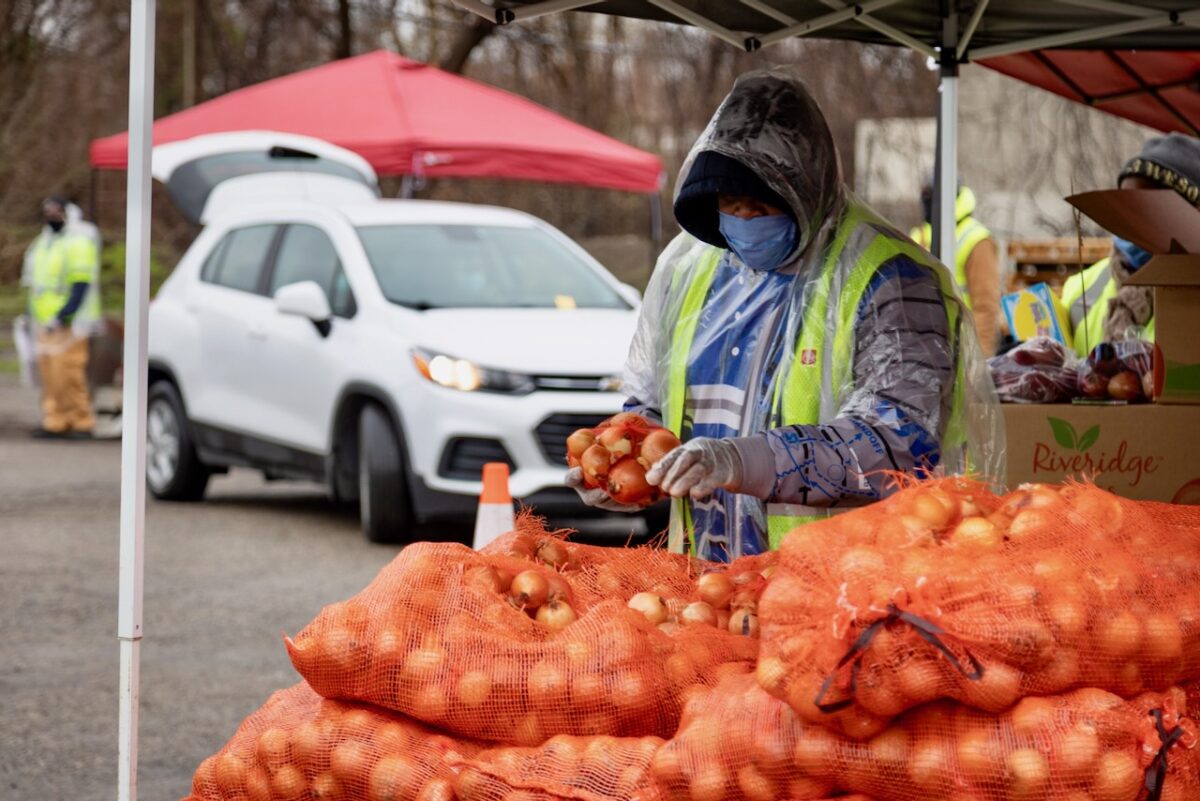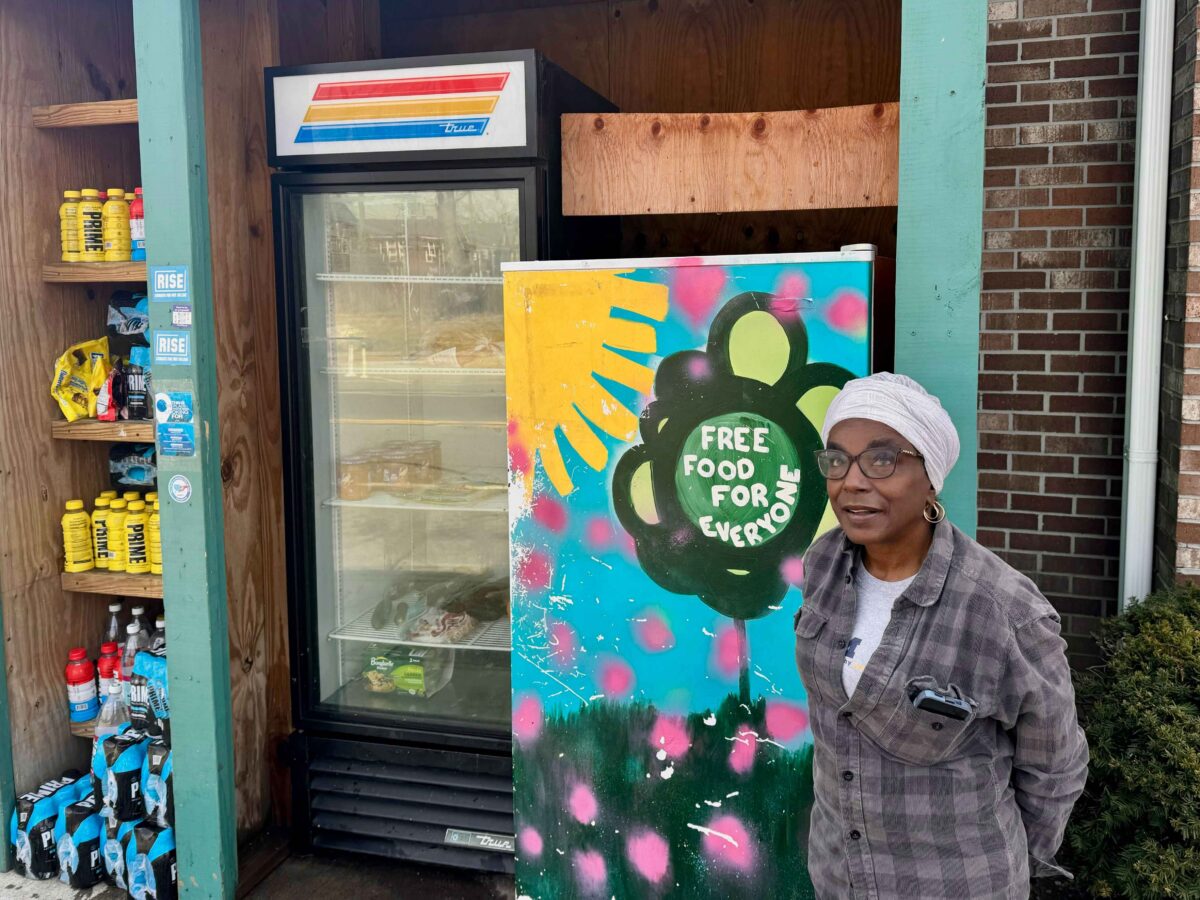Overview:
-"The federal government is usually our source for feeding people, and instead they are the reason that we are not going to be able to feed people, and that's pretty sad," says the executive director of Detroit nonprofit GenesisHOPE.
-Recent cancellations of $4.3 million in state food bank orders due to USDA spending reshuffles have cast uncertainty over Detroit programs.
-Detroiter Theresa Pettaway says Pilgrim Baptist Church's food distribution "makes a difference in these hard times."
On a cloudy, wet morning in April, a caravan of cars stretches several blocks across Detroit’s Conant Gardens neighborhood. Among those in line is Linda Collier, who for over a year has been frequenting the food distribution event at Pilgrim Baptist Church on the city’s northeast side.
“I don’t really miss a Thursday at all,” said Collier, who lives a couple miles away from the church. “The need is there, so I get up early and I get in line.”
Since 2007, the church has been distributing food to hundreds of families across the city, as well as residents of Macomb and Oakland counties. Each week, those in line arrive by 9 a.m. in order to go home with a grocery cart or trunk’s worth of canned goods, proteins, dairy, and produce.
For Yvette Griffin, lead pastor at Pilgrim, the familiar scene is tainted by temporary shortages and funding cuts to food banks.
In late March, the Food Bank Council of Michigan announced that $4.3 million in state food bank orders were canceled as the United States Department of Agriculture moved to reshuffle the spending in its Emergency Food Assistance Program. Among those food banks impacted were Oak Park-based Forgotten Harvest and Detroit-based Gleaners.
The shuffling of federal funds has contributed to temporary confusion among food bank leaders, and anxiety across food pantries and their frequent users.
“People come here because they know that we support them,” Griffin told Planet Detroit. Pilgrim Baptist Church’s food distribution primarily serves low-income families and seniors living on fixed incomes.
“I’m afraid that support is going to decrease because we won’t have the tools that we need to help them.”

Yvette Griffin, pastor of Pilgrim Baptist Church, speaks to a person waiting in line for food distribution. Photo by Tony Eggert/Three Lyons Creative.
‘Food banks are very resilient’
In the weeks following the USDA announcements, the Food Bank Council of Michigan has received more clarity. No changes will be made to the base funding of the Emergency Food Assistance Program, or TEFAP, “the safety net” for food banks, according to Dawn Opel, the council’s chief innovation officer and general counsel.
The Trump administration moved to eliminate funding from the Commodity Credit Corp. to the TEFAP for the remainder of the 2025 fiscal year, which ends in September. Instead, food orders were purchased through Section 32, another funding source that was recently approved for an additional $261 million, according to a March 28 statement from the council.
“We still don’t know when they’re going to start purchasing the product from that money (Section 32), and we don’t know the percentage that will be allocated to Michigan, but it’s sort of taketh away and then giveth in other ways,” Opel said.
Neither does the council have clarity on whether the Commodity Credit Corp. will see funding in the next fiscal year, she added. But part of the inherent role of food banks is to future-proof in scenarios like these.
“Food banks are very resilient in weathering change,” Opel said.
“We’re doing the work regardless of a change in one program or policy. It’s really about the future and ensuring that we have these resources in communities to go to people who need them.”
How Trump’s tariffs are set to raise Michigan grocery prices
Trump’s tariffs on imports could lead to a 2.8% increase in food prices, disproportionately impacting low-income households and complicating decision-making for food companies and farmers.
Detroit community fridges highlight mutual aid efforts around food insecurity, waste: ‘We’re scrappy’
Community fridges, popularized during the COVID pandemic to address surges in food costs, are a mainstay in a handful of Detroit neighborhoods, with room for expansion into more parts of the city.
Paper or plastic? Local grocers embrace shift away from plastic bags
Several metro Detroit grocery stores, including Western Market and Detroit People’s Food Co-op, are opting for paper bags in the name of environmental sustainability.
Detroit food distributors grapple with funding uncertainty
On the ground, among Detroit-area food distributions and pantries that are reliant on USDA-purchased food, some are concerned about shortages ahead.
“A lot of our sources are OK this year, but it’s next year that we anticipate feeling this impact,” said Jeanine Hatcher, executive director of GenesisHOPE, which has food distribution programs that primarily serve families and senior residents across Detroit’s Islandview and Greater Villages neighborhoods.
The organization sources boxes of food from local groups such as Forgotten Harvest, Focus: HOPE, and Eastern Market, Hatcher said — organizations that in turn rely on federal funding from the USDA.
“My biggest concern is with people, not that our load is going to increase. Our volume is going to increase, and I don’t foresee us being able to meet the increased demand.”
Food distribution programs have seen a marked increase in recipients, Hatcher said.
“I’m just kind of bare knuckling it. I don’t know what we’re going to do … the federal government is usually our source for feeding people, and instead they are the reason that we are not going to be able to feed people, and that’s pretty sad.”
Detroit saw a rapid expansion of food distribution sites in recent years. At the height of the COVID pandemic, over 200 “food pantry” locations were operating across the city, according to Alex Hill, an adjunct professor at Wayne State who created the Detroit Food Map, a data visualization of the availability, price, and quality of healthful foods.
“Food pantries were an essential stopgap for a lot of folks,” said Hill. “You could pick up a food box from different locations any day of the week, which was incredible. And the reason that was so incredible was because of the USDA.”
Worries are running high among organizers about how the downsizing of federal departments will impact their efficacy and programming.
“(The USDA) hasn’t just been giving food banks money to buy food,” said Bernadette Doré, executive director of Project Healthy Community, a community organization on Detroit’s northwest side focused on addressing food insecurity and reducing chronic illness.
“They’ve also been looking at the long term issues of trying to help folks eat healthier, learn how to cook the food, learn how to try different kinds of food.”
Through USDA programming and funding, Doré said, Project Healthy Community has been able to provide nutritional education to schoolchildren and seniors.
“That’s the agency that has taught us how to do this work. Whatever all these government agencies look like next year, there’s going to be so few employees. So fundamentally, it’s just going to be difficult for anything that’s supposed to be working.”
In the face of inflation and rising household expenses, food pantry recipients are concerned.
“I have three grandkids that I’m raising and I’m on a fixed income,” said Theresa Pettaway, who has been attending Pilgrim Baptist’s food distribution for the last month.
“I look forward to this. Somebody told me about it and I’ve been trying to get over here ever since. It makes a difference in these hard times.”





